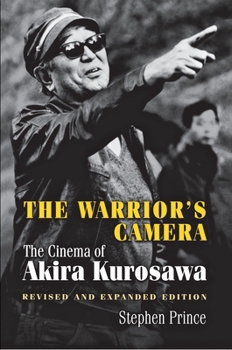The Warrior's Camera: The Cinema of Akira Kurosawa - Revised and Expanded Edition
Select Format
Select Condition 
Book Overview
The Japanese film director Akira Kurosawa, who died at the age of 88, has been internationally acclaimed as a giant of world cinema. Rashomon , which won both the Venice Film Festival's grand prize and an Academy Award for best foreign-language film, helped ignite Western interest in the Japanese cinema. Seven Samurai and Yojimbo remain enormously popular both in Japan and abroad. In this newly revised and expanded edition of his study of Kurosawa's films, Stephen Prince provides two new chapters that examine Kurosawa's remaining films, placing him in the context of cinema history. Prince also discusses how Kurosawa furnished a template for some well-known Hollywood directors, including Martin Scorsese, Steven Spielberg, and George Lucas. Providing a new and comprehensive look at this master filmmaker, The Warrior's Camera probes the complex visual structure of Kurosawa's work. The book shows how Kurosawa attempted to symbolize on film a course of national development for post-war Japan, and it traces the ways that he tied his social visions to a dynamic system of visual and narrative forms. The author analyzes Kurosawa's entire career and places the films in context by drawing on the director's autobiography--a fascinating work that presents Kurosawa as a Kurosawa character and the story of his life as the kind of spiritual odyssey witnessed so often in his films. After examining the development of Kurosawa's visual style in his early work, The Warrior's Camera explains how he used this style in subsequent films to forge a politically committed model of filmmaking. It then demonstrates how the collapse of Kurosawa's efforts to participate as a filmmaker in the tasks of social reconstruction led to the very different cinematic style evident in his most recent films, works of pessimism that view the world as resistant to change.
Format:Paperback
Language:English
ISBN:0691008590
ISBN13:9780691008592
Release Date:December 1990
Publisher:Princeton University Press
Length:368 Pages
Weight:1.16 lbs.
Dimensions:0.9" x 6.1" x 9.2"
Customer Reviews
4 ratings
The Filmmaker/Critic's bible.
Published by Thriftbooks.com User , 18 years ago
This is one of my favorite books on film in existance. Stephen Prince gives a beautiful analysis of Kurosawa's entire career. The way he goes into detail about each film and the meta-textual/contextual support he gives to one of cinema's greatest directors is fantastic. His writings on Yojimbo were definately the high point of the book for me (it only further cemented it as my favorite Kurosawa film). I wish more film scholars produced such cultural and over arching comparatives as Prince presents here.
Excellent study of a master filmmaker
Published by Thriftbooks.com User , 23 years ago
"The Warrior's Camera" is not a casual book for fans of "Yojimbo" and "The Seven Samurai." It is a dense, scholarly tome designed for film majors to study. The book takes for granted that you are familiar with the films of Eisenstein, the books of Dostoyevsky and the plays of Bertold Brecht, as well as the personal philosophies of each of these Kurosawa influences.This is also not a biography, and none of Kurosawa's personal life is put on display. Films are dissected shot by shot in tight detail.However, if you are prepared, "The Warrior's Camera" lends tremendous insight into a fascinating director. Each chapter focuses on philosophical themes central to Kurosawa's work, and dives into the films that most represent these personal philosophies. The strength of the individual, and the ability for personal choice, is outlined by "Drunken Angels," "No Regrets for Our Youth" and "Stray Dog." Strength of will is shown in "Ikiru" and "Red Beard." As this is a scholarly work, each chapter presents an argument and then presents evidence to support the argument. I have come away from this book with a much deeper understanding of Kurosawa and what he was trying to accomplish with his films. Highly recommended, but be prepared to work for your knowledge.
One of the best Books On Kurosawa!
Published by Thriftbooks.com User , 24 years ago
The Warrior's Camera is a really intelligently written book with very important information about the groundbreaking director. The book is worth buying just for the Legacy section of the book, which is a wonderfully written section about Kurosawa's legacy. This section also has some great quotes from other film directors, such as Steven Spieldberg and George Lucas, and prominent film critics. The book also has some great info on his style and the way to view a Kurosawa film. If you are writing a report on Kurosawa or if you are just a big fan, make sure that you pick up this book along with his biography.
WONDERFULLY INSIGHTFUL!
Published by Thriftbooks.com User , 25 years ago
I have the pleasure to have Dr. Prince as a teacher at Virginia Tech, but his book is one of the best books on Akira Kurosawa. I have been a fan of Kurosawa since I found my intrest in film at the ripe young age of 15. I have read his audiobiography, and next to that this is the only book that actually said something. It has many details not even in the biography, and insighful information on all his important works.






